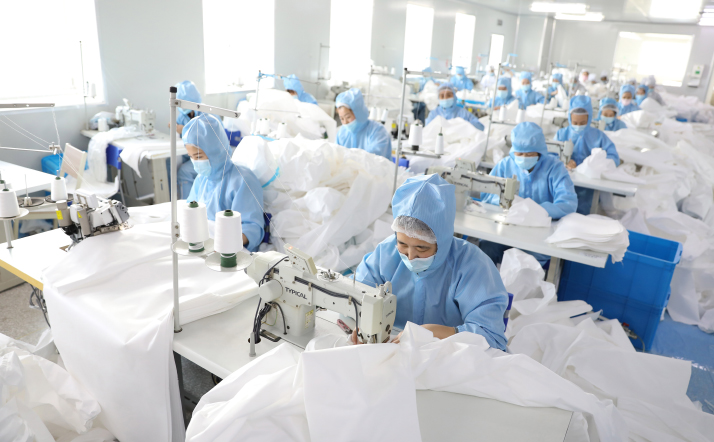| Business |
| Globalization at a Crossroads | |
| The coronavirus pandemic is likely to change the direction of international economic integration | |
|
|
 Workers produce protective suits in a factory in Liaoning Province, northeast China, on March 2 (XINHUA)
Some sectors of the economy have been struck particularly hard by the outbreak, especially the travel, hospitality and transportation industries. Some airlines may not be able to survive the current crisis. The auto manufacturing, electrical and electronics as well as pharmaceutical sectors have also seen great pressure, as the pandemic forces intermediate product manufacturers to suspend business and affects consumer demand and supply chains. The pandemic will also have a big impact on international projects of major significance. Contractors may well be confronted with challenges in fulfilling contracts, financing and getting employees to restart work. Consequently, some projects might have to be postponed, halted or even canceled. The shrinking international trade is another concern. Figures from the World Trade Organization show that global cross-border trade saw a year-on-year drop of about 10 percent in February. A worldwide slowdown of trade will lead to a decline in the global economic growth. The Organisation for Economic Co-operation and Development (OECD) predicted in a report released on March 2 that the U.S. growth rate this year will drop from 2 percent to 1.9 percent, that of Japan from 0.6 percent to 0.2 percent, eurozone from 1.1 percent to 0.9 percent and China from 5.7 percent to 4.9 percent. Such a prediction may be over-optimistic. The global economic growth rate in 2020 could be much lower than the OECD's forecast. The pandemic has heightened the risk of a global economic crisis. Recently, erosion of confidence in the global capital market, coupled with a plunge in the international stock markets resulting from plummeting oil prices, has led the world into a short-term recession. The temporary recession can evolve into a full-blown crisis if the pandemic lasts, if major powers fail to come up with effective measures, or if coordinated relief efforts from the international community come too late. It's safe to say that the risk is increasing. The international community should have a clear understanding of the current situation and stay alert to the dangers. Deglobalization challenges Worse still, the pandemic, coupled with the temporary global economic recession, will severely erode the confidence of producers and consumers, and the anti-globalization sentiment will see a rise. If isolationism, unilateralism, popularism and protectionism take hold, it will most certainly hurt economic globalization. The anti-globalization sentiment will deal a heavy blow to bilateral and regional trade and investment liberalization, as well as economic integration. In this context, new uncertainties may arise in implementing the China-U.S. phase-one economic and trade deal, hammering out the China-Europe investment deal in 2020 and launching the feasibility study for the China-Europe free trade agreement. The outbreak will also prolong negotiations on the China-Japan-Republic of Korea free trade agreement and add to difficulties for the three countries' joint efforts to advance the Regional Comprehensive Economic Partnership process. Major countries will be confronted with more complex changes in economic and trade ties. The pandemic might result in a more complicated China-U.S. relationship. More challenges might also arise in China-Europe cooperation. The picture of U.S.-Europe ties is not upbeat either. Trade conflicts between the two sides in 2019 resulted in a sluggish economy in the EU. Their hope of inking a mini trade deal in March has been dashed because of the epidemic, disputes over Airbus subsidies and the digital service tax. What next? The international community should make concerted efforts to fight the pandemic and improve the global public health governance system. The virus knows no borders or nationalities. It's a major challenge confronting the international community. Building a community with shared future for humanity and formulating a cooperation mechanism to fight against common enemies have become an urgent need under the current situation. A coordinated global public health action mechanism of higher level, such as one comprising Group of 20 heads of state or health ministers, should be set up to take effective steps in a more timely manner when faced with global public health emergencies. Public health security should be included in the world's security framework, and joint efforts should be made to cushion the heavy shocks to the global economy and international community caused by emergent public health crises. China, where the situation is almost brought under control and which has gained valuable experience in combating the coronavirus, should engage more in international and regional cooperation to contain it. Chinese medical teams have been sent to assist some hard-hit countries. As the outbreak rages in more countries, China should assemble more emergency teams of medical staff and experts to give a hand to other countries. More support should be given to the World Health Organization (WHO). Major countries should do more to buoy WHO, share data and technological breakthroughs related to fighting the pandemic, team up to study the source of the virus, create vaccines and produce medicines. One or several international foundations against epidemics should be established by the World Bank and other multilateral financial institutions. Once China's economy is rebooted in all sectors, it will have the capacity to deliver more help to other countries to fight against the coronavirus. This will be a great contribution to the stability of the global economy. China should and will produce and export more medical supplies to meet the demand of epidemic control both at home and abroad. China's market, especially the services sector, should be further opened to break new ground. Free trade policies related to medical care and health industries should be implemented in pilot free trade zones such as Hainan Province in south China. The author is president of the China Institute for Reform and Development Copyedited by Madhusudan Chaubey Comments to linan@bjreview.com |
|
||||||||||||||||||||||||||||||
|